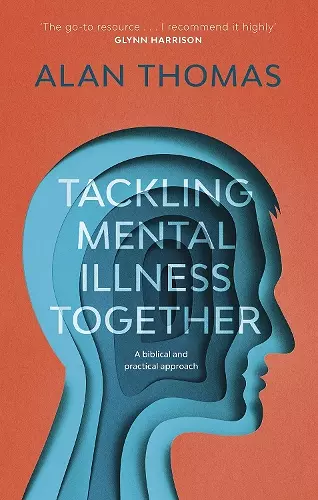Tackling Mental Illness Together
A Biblical And Practical Approach
Format:Paperback
Publisher:Inter-Varsity Press
Published:16th Nov '17
Should be back in stock very soon

Supporting mentally ill members of your congregation and community - you don't need to be an expert to make a difference
Revolutionise the way you deal with the mentally ill in your congregation and community - you don't need to be an expert to make a differenceA biblical framework for understanding mental illness and helping the mentally ill. Synthesises the relevant biblical material with our scientific understanding of mental illness. Equips the reader to deal wisely, intelligently and compassionately with issues of mental health in churches and the community. Helps us discern between bad behaviour which is a result of illness and that which results from sin - How do we deal wisely, intelligently and compassionately with those who suffer from mental illness? - Can we really make a difference if we aren’t professionals? - Is it possible to discern between bad behaviour due to illness and that caused by sin Discover how your church can become a safe, encouraging and healing place. 'The next-best thing to spending a week shadowing Professor Thomas.' Sinclair Ferguson 'Rational, readable and relevant, this book confirms that all involved in pastoral work can help tackle mental illness.' Andrew Fergusson 'The go-to resource for those who want to know more: the wisdom of reliable clinical experience laced with academic rigour and good common sense, all grounded in God’s word. I recommend it highly.' Glynn Harrison 'Empowers us all to play our part.' Debbie Hawker 'An accessible, practical, sensible and biblically grounded resource to help us navigate this challenging terrain.' Sharon James 'Presented in a way that will instil confidence that we can work with mental health professionals.' Nick Pollard 'Alan Thomas has shared his own important insights in what will become a standard book on the subject, accessible and wise.' Geoff Thomas
Whether as a professional, carer, family member or perhaps a patient, every one of us will have been affected by mental illness. Christians may face further distress: is this behaviour sin or is it sickness? From a biblical and medical framework, and using case examples, consultant psychiatrist Alan Thomas makes everything clear. Rational, readable and relevant, this book confirms that all involved in Christian ministry and pastoral work can help tackle mental illness. -- Dr Andrew Fergusson * E-mail *
Attitudes to mental illness today are still disfigured by too much fear and too little understanding, and Alan Thomas has written the go-to resource for those who want to know more about this crucial area. Firmly rooted in sound scholarship, it is nevertheless hugely accessible to its target readership - pastors, clergy and all those wanting to understand more about their own struggles or those of a family member. Here they will find the wisdom of reliable clinical experience laced with academic rigour and good common sense, all grounded in the Word of God. I recommend it highly. -- Professor Glynn Harrison
This easy-to-read book improves our understanding of common mental health problems and their treatments. Using case studies and biblical teaching, it also empowers us all to play our part in helping, by reminding us that the little things (like listening, warmth and kindness) can help improved the mental health of those we encounter. -- Dr Debbie Hawker
This is a unique book, coming from a qualified, experience and deeply thoughtful man, dealing with a subject demanding much insight, compassion and also plain speaking. Making a certain distinction between immoral behaviour and that which is the result of a disease of the mind can at times be perplexing. Every case seems to be uncharted territory. There have been occasions when we have needed help. To whom can we turn? Now my friend Alan Thomas has shared his own important insights with us in what will become a standard book on the subject, accessible and wise. -- Geoff Thomas
Professor Alan Thomas is a psychiatrist with research interests in brain imaging and molecular biology. But he believes that human beings are more than just physical matter. Rather, we are holistic combinations of material bodies and immaterial spirits/minds - what he calls ‘psychosomatic wholes’. So, his book combines examples from his clinical practice, with summaries of scientific research, and theological reflections on the Bible’s teaching about the nature of humanity. The result is a comprehensive analysis of treatment possibilities for psychiatric disorders, presented in a way that will instil in church leaders the confidence that we can work together with mental health professionals as we seek to help people find healing from mental illness. -- Nick Pollard (Co-founder of EthosEducation.org and Chair of ‘A Spiritual Path to Mental Health’)
ISBN: 9781783595594
Dimensions: unknown
Weight: 304g
232 pages